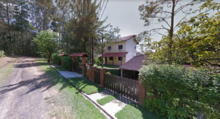Llunfurt
Llunfurt | |
|---|---|
 Maldras, 2015. | |
| Country | |
| Province | |
| Settled | 1888 |
| Established | 6 April 2015 |
| Government | |
| • Body | Maldras Prefecture |
| • Administrator | Hugo de Toledo |
| Population | |
| • Total | 4 (permanent) |
| Demonym | Maldrasian |
Llunfurt, officialy the Municipality of Llunfurt (Portuguese: Município de Llunfurt) is the capital and one of the two equally-large settlements of the Province of Schwarzberg. The municipality has 4 permanent residents and in it is located the highest point of Ebenthal, Mount Schwarzenadel, at 1,155 meters high, in Royal Rupestrian Park, the largest nature reserve in the country.
The municipality was established in 6 April 2019 as capital of the then Principality of Negromonte, ruled by Prince Hugo I, which had just been created as a Federative Unit of Ebenthal. Nevertheless Ebenthal has only acquired de jure sovereignty under Schwarzberg with the Concession Treaty held at Maldras and signed by the King Arthur II of Ebenthal and the Reigning Princes of the Ebenthali principalities. Before the town's foundation, the lands corresponding to Maldras had been part of the Brazilian municipalities of Resende, when it was acquired by the Toledo family - the former Schwarzberger Princely Family - in 1888, and later Itatiaia.
Maldras is governed by the Prefecture elected througn universal suffrage by the Maldrasian people and formally appointed as Prefect, often called Administrator, by the President of the Province. The municipality, composed of a single two-store building and a large chunk on uninhabited land, is not divided into districts, boroughs or neighbourhoods and it has no legislative body, instead being entirelly administrated by the Prefect, although the Royal Rupestrian Park falls under the administration of the Ministry of the Environment.
Etimology
The municipality was named Maldras after the namesake Suebi King Maldras, who reigned over Galicia from 456 to 460. The name was introduced by Hugo I, first Prince of Schwarzberg, who named the Schwarzberger towns after Suevi and Visigoth monarchs.